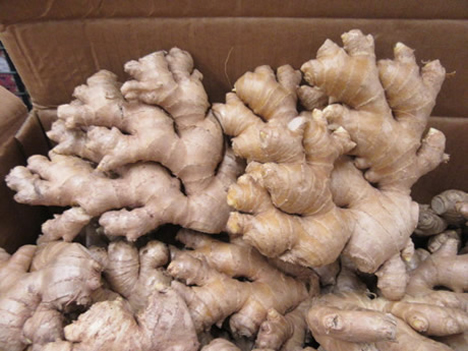
By Emily Okello
Ginger, locally known as Tangawizi, is a crop rarely grown in Kenya despite huge demand both locally and internationally, with some 90 per cent of the ginger consumed in Kenya sourced from Uganda, Tanzania, South Africa, China, Ethiopia, or India.
According to the Horticultural Crops Directorate (HCD), in 2018, Kenya produced 93 tonnes of ginger, valued at Sh9,672,000, up from 84 tonnes in 2017.
Exports were, however, negligible, at just 704 kilograms in 2019, up from 32.5 kilograms in 2017. Kenya did not export any ginger in 2018. While local production remains so low, Kenya cannot meet the bulk volumes required to be a regular exporter into the world export market.
Related News:FarmBiz TV:Farmer leaves knives for Sh12m a year from garlic and ginger.
But the local deficit is now luring some farmers into the crop.
Carol Chelangat, a farmer at Herbs and Spices Propagators, says they started growing ginger in 2019 on one acre of land due to the deficit in the country. With limited competitors in the local market, the returns have been great. For every one kilogram of ginger seeds sowed, they harvested 10 to 20 kilograms of fresh produce. Now they have 10 acres of land under ginger and this is still not enough to meet the local demand.
To supplement the locally available produce, their customers import ginger mainly from Uganda, 60 per cent of which is consumed locally, while 40 per cent is exported to European countries.
“Not much ginger is grown in the country, imports are required to satisfy local consumption levels. Most farmers focus on tomatoes, maize, and other horticultural crops because their knowledge on ginger farming and its lucrative international market is still scant,” said Caro.
”In Europe, the crop is especially in demand over the cold season due to its medicinal properties.”
Related News:Fortune beckons for Kirinyaga herbs farmer after abandoning dairy
Related News:How to grow and improve ginger yields using compost coffee husks manure
According to statistics from the Centre for the Promotion of Imports from Developing Countries CBI, in 2018, European direct imports of dried ginger from 127 developing countries reached 127 thousand tonnes. China remains Europe’s main supplier of ginger. Other high volume exporters to the EU are Peru, Nigeria, Brazil, Thailand, and Burkina Faso.
Herbs and Spices Propagators guidelines for beginners are that they need 500 to 1,000 kilograms of seeds for an acre to give an average yield of 10 to 20 tonnes of produce. They estimate a farmer can spend Sh243,000 to cultivate an acre. But that translates into Sh522,000 in returns, assuming farmers sell their ginger at a price, below current levels, of Sh75 per kilogram. The production cost factors in everything from the price of seeds, first and second ploughing, furrowing, manuring, fertilizer costs as well as the budget for hiring planting and harvesting labour.
From Caro’s experience, “ginger has a low pest infestation rate and is easy to manage. Since it’s not perishable, it can be irrigated and harvested when demand is high. Through value addition you can dry the ginger and sell as flakes or powder and get double the revenues,”
The most common ginger variety in Kenya is the hybrid (Jamaican) with big rhizomes. Regions on the Coast, Western, and Nyanza present more suitable growing conditions, however, ginger is hardy and thrives in most parts of the country.
In Kenya, the domestic market prefers green ginger, while dried ginger is mainly produced for export purposes. The crop fully matures after 6 to 8 months when the leaves have turned yellow and start drying. However, for vegetable purposes, rhizomes are harvested after 180 days.
Ginger seeds cost Sh150 per kilogram.
For ginger seeds, contact Carol Chelangat, Herbs and Spices Propagators growers, processors, packers and distributors, Kiambu on 0708847772 This email address is being protected from spambots. You need JavaScript enabled to view it.
















Comments powered by CComment